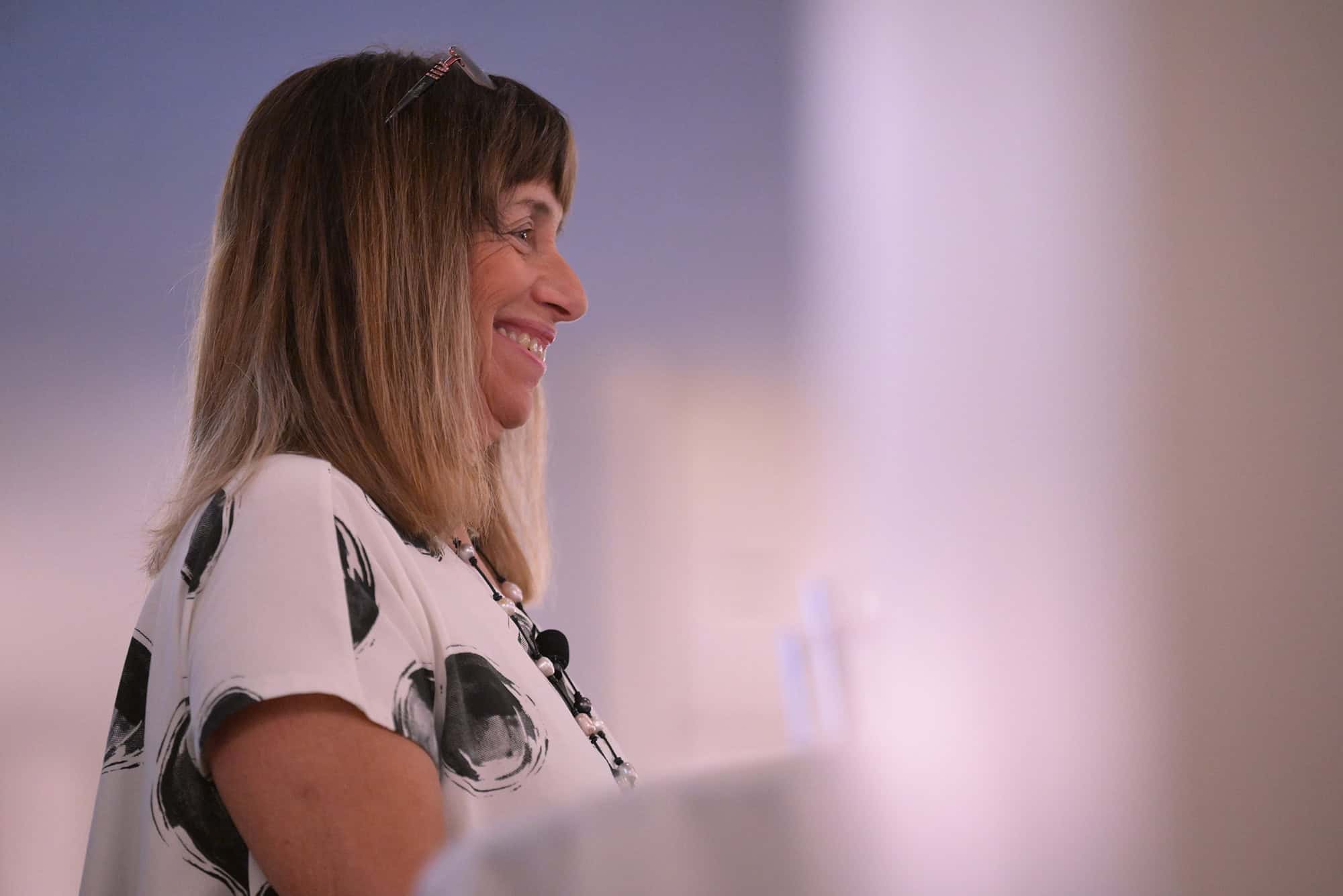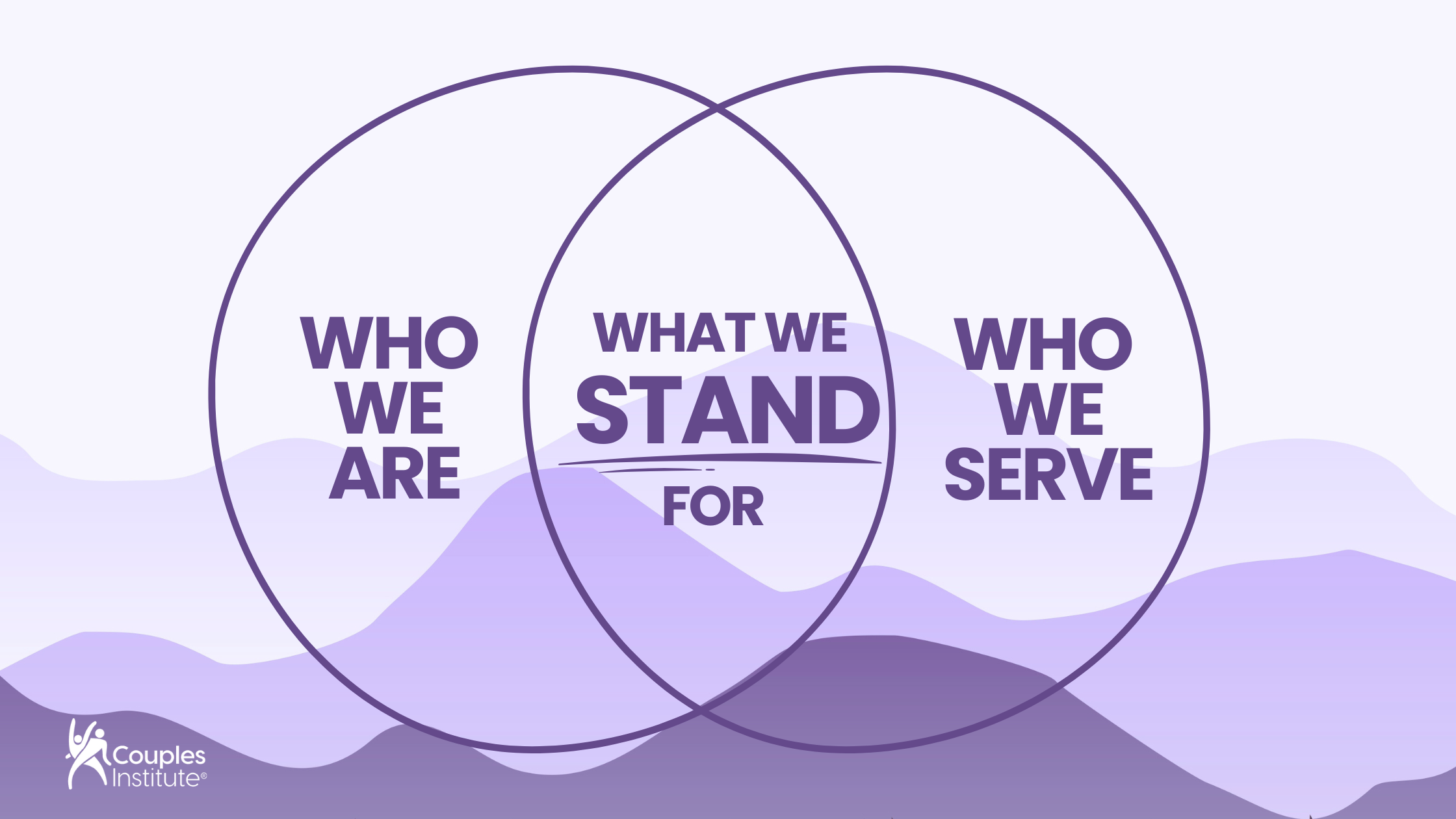
Pete and Ellyn’s Origin Story, or “How I Met Your Mother”
[Editor’s note: this love letter went to our email list on Valentine’s Day and it seemed good enough to give it a permanent home on

Once again, I am on a plane with some time to write. I’m glad to complete part two of the Networker Conference highlights for you. I’ll start with the workshop I presented on Infidelity, then summarize a keynote panel on Therapy in a Polarized World, and also two clinical workshops demonstrating therapy unfold in real time.
What Makes Infidelity So Hard to Heal?
Let’s start with something close to my heart: the complexity of repairing infidelity.
In my workshop at the Symposium, I shared what makes infidelity challenging for couples to repair. It’s not about the sex. It’s about the violation of agreements, lies, deception and disorientation.
When a monogamous partner discovers betrayal, a boundary has been crossed. Security, attachment, and perceptions of reality get turned upside down.
The questions that linger are haunting:
And when one partner offers only a quick, superficial apology, the real work hasn’t even begun.
What do I recommend in these moments?
When infidelity is laced with significant deception, repair by the lying partner involves:
What makes infidelity repair hard for you? I’d love to hear your thoughts in the comment section below.
Keynote Panel: Therapy in a Polarized World
Earlier this year The Couples Institute led a series of community discussions to support therapists and coaches with new challenges they are facing due to the political divide in the US. So I eagerly attended the keynote panel discussion on Therapy in a Polarized World, by Bill Doherty, Esther Perel, and Monica Guzman. They did not disappoint, as they addressed emotional dysregulation in a politically divided world.
Clients ask questions never before encountered…
The panelists’ overall message was to keep the conversations going. Look for opportunities for dialogue with those who strongly disagree with you. Don’t shy away from those chances to polish your brain from the friction created and the steadiness needed to stay open and engaged with people who see the world differently than you do.
Just one week later I was able to have a very enlightening conversation with an Uber driver who was outspoken about views very different from mine. He was 100% certain that reducing the national debt should be the primary goal of all decisions and policies.
And next week I will be building bridges in a session with a trans daughter and her vocal father who posts frequent messages on social media that he is glad no boys will be allowed in girls sports. Please be sure to post in the comment section below if you are navigating these tough dialogues in your practice.
The panelists offered a historical statistical look at how our views have hardened. Rather than outlining the details in this blog post, I’ll include a descriptive summary:
Attitudes towards inter-party marriage seem to be changing in today’s partisan climate. In an article for Voice of America, Kevin Enochs (2017) summarized data from 1958 and 2016 on how parents would feel if their child married someone from the opposite party. Gallup polling data from 1958 revealed that 33% of Democrats and 25% of Republicans wanted their child to marry someone from the same party. Enochs reported that political scientist Lynn Vavreck asked a similar question in 2016, finding that 60% of Democrats and 63% of Republicans wanted their child to marry someone from the same political party.
Political polarization has only increased since 2017 and it is reasonable to expect that views about “inter-party marriage” continue to harden. A consideration in therapy is that politics now provides a new enemy to serve as “the other” identity to fear, fight, or reject.
Let’s talk more about these challenges in training, in supervision, and in community forums. If you are navigating similar terrain, please share any related moments in the comment section below.
Clinical Highlights: Real Therapy, Real Impact
There’s nothing like watching great therapy unfold in real time. So I was pleased to spend time in two clinical workshops where the presenters showed videos of their work.
Diana Fosha was masterful – diving deep, fast, with a clear frame.
She explained to clients, “I may interrupt. I may redirect. Let me know if anything feels off.”
She tracked her client’s emotions moment by moment. One beautifully attuned question was “Are you okay with your tears coming now, with me?”
And this one lingered: “Tell me more about what you really don’t want to talk about now.”
Leanne Campbell shared her EFT approach for trauma work with individuals. She summarized her process as:
She worked with a young woman who had essentially raised herself due to massive neglect. What stood out most for me? Leanne’s fierce attunement – always tracking whether the client was moving toward or away from the connection with her.
Over to You
Please share your thoughts in the comment section below. What’s sticking with you from these highlights? What’s helping you feel brave in the room – or out of it – these days? I look forward to reading your responses.
Let’s keep learning together.
"*" indicates required fields
 We respect your privacy.
We respect your privacy.
"*" indicates required fields
 We respect your privacy.
We respect your privacy.
[Editor’s note: this love letter went to our email list on Valentine’s Day and it seemed good enough to give it a permanent home on

As we look into the New Year, I want to share with you very clearly what Couples Institute stands for, now and always. Most of

My passion for educating couples early in their committed relationships was initially driven by personal experience. When I married at 22, my husband and I
Thank you for summarizing “Therapy in a Polarized World” for us. The divide sometimes feels like the elephant in the room. I also got value from each of your other quick highlights and loved, “Tell me more about what you really don’t want to talk about now.” It feels gentle.
The use and frame of “Polarized World” is a pathetic and enabling stand-in for what is truly and clearly violence, abuse, hatred,extreme systemic and structural discrimination, harassment, violence, and the seeding of indirect and direct genocide. But psychos gonna psycho, reframe to the point of disconnect, and put the burden on the victims of violence to maintain “wellness” or “emotional regulation”, and to play saviour from relative a position of superiority and safety, while medicalizing, marginalizing, and pathologizing the victims without having any effect of the perpetrators or pathologizing them. Stay away from trans people and issues. You’re only making it worse.
Ellyn, what a great summary of these valuable presentations. I continue to appreciate your generous sharing of “pearls of wisdom.” I constantly tell young therapists, don’t wade out into the deep water of couples work alone. If there is one training that will give you the boat, the oars and the navigation map, I recommend without reservation, it is Ellyn Bader’s Developmental Model.
I’m navigating sessions with clients who have differing approaches and opinions than I by listening empathically & being curious about how their particular perspectives developed. Richly emotional and often deep dives result as clients pick through memories & their personal history to respond.
Thanks, Ellen, for your summary comments.
Thank you so much for this post. This political divide has reached such monumental proportions now that it is like interracial marriage and gay marriage were before. I have been married before to someone of the opposite party, and it was uncomfortable, but now it has become unmanageable. How terribly sad! All this is dividing families and friendships. We used to be able to agree to disagree, but now that is impossible. This has to be so damaging to us all. And on the subject of infidelity, I wonder if it is even more devastating to be cheated on if you had severe attachment issues as a child. Just when you finally think you can trust someone, those beliefs are dashed. It must be like going back to square one in your healing process!
I attended the symposium on zoom and agree the keynote w Esther Perel was mesmerizing. They went deep and far in every sentence. So intellectually stimulating. I wish I could have taped it to share.
I would love to see bonus calls or role plays on these issues, thanks for posting about them, so relevant. One thing I have pondered, is the revelation of hidden addictions like infidelity? (Probably no generalized answer… so much the real answer is: it depends…) In my own extended family, the political divide has been costly. People agree to stay “in” the relationships, with love, but you can feel something has been lost, and there are eggshells to walk upon. Great subjects.
Thanks Ellyn, for the nice summary, and…great photo!
Your work, thoughts and shared insights are absolutely fascinating and SO appreciated Ellyn! Wow. I am trying to save up to join the Couples Institute trainings. Not ever found anything more substantive and effective than your work and strategies. Thank you for being YOU and for sharing.
Thank you for this post. As someone who specializes in couples therapy, both infidelity and political divide are topics which present significant challenge.
There is no clear roadmap for working with couples after betrayal, in my experience. It is long hard work in most cases. There is complexity and uniqueness in every couple, and the work can be painful for me as well as for the couple. I try to bring empathy for both partners into the work of course, but find my own fears of betrayal and abandonment being activated.
The political divide has produced upheaval in the world, in my work, and in my heart. I had a couple come in recently who are divided over the current administration, and I felt myself activated due to my own strong beliefs. I listened to the pain of this couple whose marriage had withstood significant trauma and challenge through the years and is now being threatened. I had to tell them that I wanted so much to help them but, in order to be authentic, I had to own my own struggle with what I see as moral disintegration in the system. I did not feel I could do good work without supporting their struggle but naming my own conflict. It felt like the most ethical and respectful way to manage the situation. I have had many conversations with peers because of the challenge my own beliefs and values have presented to being a therapist in the current political climate.
Just grateful that you have started this conversation – there are no easy answers to these hard questions.
Thank you so much Ellyn for all your sharings. Very generous. It makes me reconsider my actions. I always look forward to your next post and recommend them to my colleagues.
Yes, of course, fidelity in a relationship is a great challenge for me too. It’s easy to get lost on the road, because there are so many strong feelings on this topic. Your little summary on this topic will help me to be more confident in therapy.
Thank you all for your comments! I really enjoy reading them-and to be honest they help me feel good about continuing to put in the time writing these blogs. Writing does not come easily for me-and I had a mother who was a writer and a perfectionist. So, it is easy for me to get very self critical when I write. Many thanks!!!
Dearest Ellyn: you have been my teacher and my mentor and at one point my supervisor since 1991 and I so appreciate when you share personal aspects from your upbringing. I feel so grateful to have participated in all the aspects of training that you offer. Please keep writing! I really wanted to attend the networker conference this year and could not and so this was a wonderful opportunity to benefit from the speakers’ perspectives on these important topics. Thank you so much for all you do to help us improve our work with Couples; it is the most rewarding work I could possibly think of doing — thanks to your support and guidance. With much appreciation, Ann Langley
Thanks Ellyn for your thoughts on what makes infidelity is hard to heal. From our work here, and we are now dealing with a lot of it is -; 1. the confusion between forgiveness and the process of healing (especially among the religious folk). The offender feels that the betrayed partner should forgive them and move on.
2. the tendency of the offender to want to quickly move on only offering a quick superficial apology as you mentioned.
3. Societal pressure to maintain status quo (of a happily married couple) forces many betrayed partners to comply and move on even when the issues haven’t been adequately dealt with.
4. cultural norms that gives men a leeway to escape with it not realizing the damage it has on their spouse and their relationship.
Thank you for your summary – I do wish I were there! Huge congratulations on 30 years of conferences! -such a valuable and incredible commitment to transforming couples relationships!! – the world would be in a very different place without your lifes’ work!